The harp should be regulated before it is rented. No one wants to play on a harp that is out of regulation, so the harp should be in good shape before the rental begins. Any regulations beyond that should be the responsibility of the renter. It may also depend on how much you’re paying per month and how long the rental lasts. The frequency of the regulation depends a great deal on how the harp is used and how often it is moved.
—Sam Milligan is a harpist, arranger, and former harp technician from Brooklyn, N.Y.
If you lease a car, you are still expected to pay for maintenance on the vehicle. It should be no different for a harp. The owner should maintain the harps in good regulation, so it should be in good playing condition at the beginning of the lease. But once it is in the renter’s possession, it becomes their responsibility to maintain the instrument, just as it is their obligation to replace broken strings. Some harpists rent harps for several years, as it is still a more affordable option than purchasing a harp.
Generally, individuals who rent harps offer them for a much lower monthly rate than companies that rent harps, so they do not build the cost of regulations into the rental fee. And, of course, someone who is renting a harp for professional use will need a regulation more often than someone who just has it sitting in their home.
—Jan Jennings has maintained a fleet of rental harps for over 20 years in Orlando, Fla.
So you’ve decided to rent a harp—congratulations! I still remember how excited I was when that first pedal harp came through our front door. Renting a harp is a great way to get started without having to spend tons of money, yet for the harp owner, it is fraught with peril. A harp represents a significant investment for the owner. Deciding to rent an instrument is akin to leasing a car and should not be treated casually; policies must be in place to maintain its value. Just as you expect to receive an instrument that is well kept and in good, playable condition, the owner will expect you do what is necessary to maintain the harp in the condition in which it is received.
As a renter you will be responsible for all costs relating to maintenance and upkeep of the harp. These standard costs should be specified in the rental agreement and should include replacement strings, regulation, and insurance covering full replacement value. The harp owner should specify in the rental agreement how often the harp is to be regulated. •
—Meko is director of the International Harp Museum and owner of a large private harp
collection in Windermere, Fla.















